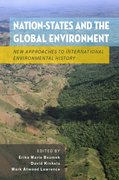Hardly a day passes without prominent journalists, policymakers, academics, or scientists calling attention to the worldwide scale of the environmental crisis confronting humankind. While climate change has generated the greatest alarm in recent years, other global problems - desertification, toxic pollution, species extinctions, drought and deforestation, to name just a few - loom close behind. The scope of the most pressing environmental problems far exceeds the capacity of individual nation-states, much less smaller political entities. This disjuncture between the enormous scale of challenges confronting the global community and the inadequacy of existing governmental mechanisms is, of course, a familiar feature of international affairs in the era of accelerated globalization since the end of the Cold War.
As flows of money, goods, labor, and information (not to mention pollutants) have become increasingly global, governments have failed to keep pace by establishing new cooperative regimes or ceding authority to supranational regulatory institutions. Moreover, just as the problems confronting them have become more acute, nation-states have seen their authority diminished by economic globalization, the growth of non-governmental activist groups, and the accelerating flow of information.
If such challenges are becoming more extreme in recent years, however, they are not as new as some commentary might suggest. As this book shows, nation-states have long sought agreements to manage migratory wildlife, just as they have negotiated conventions governing the exploitation of rivers and other bodies of water. Similarly, nation-states have long attempted to control resources beyond their borders, to impose their standards of proper environmental exploitation on others, or to draw on expertise developed elsewhere to cope with environmental problems at home.
TABLE OF CONTENTS
Contributors
Introduction
Erika Marie Bsumek, David Kinkela, and Mark Atwood Lawrence
Part I: Nature, Nation-States, and the Regulatory Dilemma
1. Europe's River: The Rhine as Prelude to Transnational Cooperation and the Common Market, Mark Cioc
2. National Sovereignty, the International Whaling Commission, and the Save the Whales Movement, Kurk Dorsey
3. Global Borders and the Fish that Ignore Them: The Cold War Roots of Overfishing, Mary Carmel Finley
4. Making Parks out of Making Wars: Transnational Nature Conservation and Environmental Diplomacy in the Twenty-First Century, Greg Bankoff
5. Going Global After Vietnam: The End of Agent Orange and the Rise of an International Environmental Regime, David Zierler
6. The Paradox of U.S. Pesticide Policy during the Age of Ecology, David Kinkela
Part II: Nature, Nations, and the Circulation of Knowledge
7. The Imperial Politics of Hurricane Prediction: From Calcutta and Havana to Manila and Galveston, 1839-1900, Gregory T. Cushman
8. Biological Control, Transnational Exchange, and the Construction of Environmental Thought in the United States, 1840-1920, James E. McWilliams
9. Bird Day: Promoting the Gospel of Kindness in the Philippines during the American Occupation, Janet M. Davis
10. Salmon Migrations, Nez Perce Nationalism, and the Global Economy, Benedict J. Colombi
11. The Brazilian Amazon and the Transnational Environment, 1940-1990, Seth Garfield
12. International Trash and the Politics of Poverty: Conceptualizing the Transnational Waste Trade, Emily Brownell
Afterword: International Systems and Their Discontents, J.R. McNeill

Erika Marie BSUMEK, David KINKELA, Mark Atwood LAWRENCE, Nation-States and the Global Environment: New Approaches to International Environmental History, Oxford, Oxford University Press, 2013 (288 pp.)
Aucun commentaire :
Enregistrer un commentaire